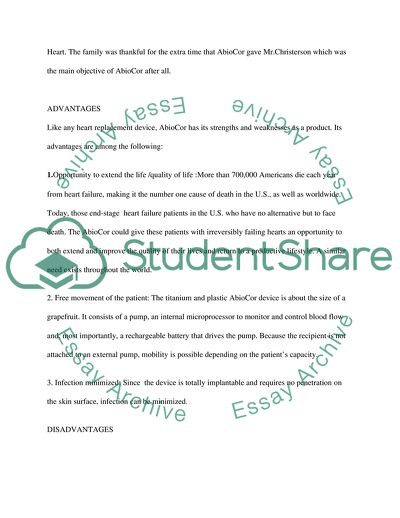
- Home
- Free Samples
- Premium Essays
- Editing Services
- Extra Tools
- Essay Writing Help
- About Us
- Studentshare
- Subjects
- Miscellaneous
- Artificial Heart - AbioCor
Artificial Heart - AbioCor - Essay Example

- Subject: Miscellaneous
- Type: Essay
- Level: Undergraduate
- Pages: 4 (1000 words)
- Downloads: 0
- Author: nevastrosin
Extract of sample "Artificial Heart - AbioCor"
their procedural protocols ( Dowling 2004 ).However, not all critical trials run successfully especially when health complications set in during the administration of the trial. This was expressed by the President and chief executive of Abiomed, when he said: "Every patient will probably die on the Abiocor. We need to understand that, with this new technology, we may have failures ( cited in bbcnews. 2001 ). Indeed, the seventh surgery performed by University of Louisville surgeons Laman Gray, M.D., and Rob Dowling, M.D., exhibited this failure as the patient died after the operation last April 10,2002.
However, it must be emphasized that the condition of the patient before the operation was already hopeless. In fact, the patient already had a history of heart problems and taking multiple medications that will stabilize his blood pressure notwithstanding the fact that he was already on the ventilator even before the operation ( Jewish Hospital , News Release 2002). This type of condition qualifies the requirements for taking part in the clinical trial- the patient must have a probability of dying within 30 days.
Fortunately, the clinical trials also have helped increased the lifespan of patients such as Tom Christerson. Mr. Christerson was able to survive for almost two years with his Abiocor Implantable Replacement Heart. The family was thankful for the extra time that AbioCor gave Mr.Christerson which was the main objective of AbioCor after all. 1.Opportunity to extend the life /quality of life :More than 700,000 Americans die each year from heart failure, making it the number one cause of death in the U.S., as well as worldwide.
Today, those end-stage heart failure patients in the U.S. who have no alternative but to face death. The AbioCor could give these patients with irreversibly failing hearts an opportunity to both extend and improve the quality of their lives and return to a productive lifestyle. A similar need exists throughout the world. 2. Free
...Download file to see next pages Read More
- TERMS & CONDITIONS
- PRIVACY POLICY
- COOKIES POLICY